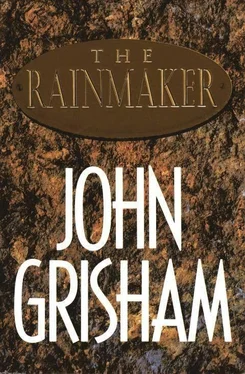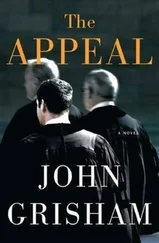“It may be, but my clients made the decision, not me.”
“Oh well, then it’ll be war,” he says in a sad monotone. He does not offer more money.
Booker and I have talked twice on the phone since we received the results of the bar exam. As expected, he’s downplaying it as a very minor and very temporary setback. As expected, he was genuinely happy for me.
He’s already seated in the rear of the small diner when I enter. We greet each other as if it’s been months. We order tea and gumbo without looking at the menus. Kids are fine. Charlene is wonderful.
He’s buoyed by the possibility that he may pass the bar anyway. I didn’t realize how close he’d come, but his overall score was only one point below the passing mark. He has appealed, and the Board of Law Examiners is reviewing his exam.
Marvin Shankle took the news of his failure hard. He’d better pass it the next time, or the firm will have to replace him. Booker can’t hide the stress when he talks about Shankle.
“How’s Tyrone Kipler?” I ask.
Booker thinks the appointment is in the bag. Kipler talked to the governor this morning, everything’s falling into place. The only snag could be financial. As a partner in the Shankle firm, he earns between a hundred and twenty-five and a hundred and fifty thousand a year. The judge’s salary is only ninety thousand. Kipler has a wife and kids, but Marvin Shankle wants him on the bench.
Booker remembers the Black case. In fact, he remembers Dot and Buddy from our first meeting at the Cypress Gardens Senior Citizens Building. I bring him up-to-date on the case. He laughs out loud when I tell him it’s now sitting in Circuit Court Division Eight, just waiting for a judge to assume responsibility for it. I recount for Booker my experience in the chambers of the late Judge Hale, just three days ago, and how I was kicked back and forth by the former Yale roommates Drummond and Hale. Booker listens closely as I talk of Donny Ray and his twin and the transplant that didn’t happen because of Great Benefit.
He listens with a smile. “No problem,” he says more than once. “If Tyrone gets the appointment, he’ll know all about the Black case.”
“So you can talk to him?”
“Talk to him? I’ll preach to him. He can’t stand Trent & Brent, and he hates insurance companies, sues them all the time. Who do you think they prey on? Middle-class whites?”
“Everybody.”
“You’re right. I’ll be happy to talk to Tyrone. And he’ll listen.”
The gumbo arrives and we add Tabasco, Booker more than I. I tell him about my new office, but not my new partner. He asks lots of questions about my old office. The entire city is buzzing over Bruiser and Prince.
I tell him everything I know, with a few embellished details.
In this age of congested courtrooms and overworked judges, the late Harvey Hale left a docket remarkably well organized and free of backlog. There are a few good reasons. First, he was lazy and preferred to play golf. Second, he was quick to dismiss a plaintiff’s suit if it offended his notions of protecting insurance companies and large corporations. And because of this, most plaintiffs’ lawyers avoided him.
There are ways to avoid certain judges, little tricks used by seasoned lawyers who are cozy with the filing clerks. I’ll never understand why Bruiser, a twenty-year lawyer who knew the ropes, allowed me to file the Black case without taking steps to avoid Harvey Hale. That’s another matter I want to discuss with him if he’s ever brought home.
But Hale is gone and life is fair again. Tyrone Kipler will soon inherit a docket that’s begging for action.
In response to years of criticism by laymen and lawyers alike, the rules of procedure were changed not long ago in an effort to speed up justice. Sanctions for frivolous law suits were increased. Mandatory deadlines for pretrial maneuvering were imposed. Judges were given more authority to ramrod litigation, and they were also encouraged to become more active in settlement negotiations. Lots of rules and laws were implemented, all in an effort to streamline the civil justice system.
Created in this mass of new regulations was a procedure commonly known as “fast-tracking,” designed to bring certain cases to trial faster than others. The term “fast-tracking” was instantly added to our legal jargon. The parties involved can request that their case be fast-tracked, but this seldom happens. It’s a rare defendant who’ll agree to a speedy trip to the courtroom. So the judge has the authority to do it on his own volition. It’s usually done when the issues are clear, the facts are sharply defined but hotly in dispute, and all that’s needed is a jury’s verdict.
Since Black versus Great Benefit is my only real case, I want it fast-tracked. I explain this to Booker over coffee one morning. Booker then explains this to Kipler. The justice system at work.
The day after Tyrone Kipler is appointed by the governor, he calls me to his office, the same one I visited not long ago when Harvey Hale occupied it. It’s different now. Hale’s books and mementos are in the process of being boxed. The dusty shelves are bare. The curtains are pulled open. Hale’s desk has been removed, and we chat with each other in folding chairs.
Kipler is under forty, soft-spoken, with eyes that never blink. He’s incredibly bright, and widely thought to be on his way to greatness as a federal judge somewhere. I thank him for helping me pass the bar exam.
We chat about this and that. He says kind things about Harvey Hale, but is amazed at the sparsity of his docket.
He’s already reviewed every active case, and targeted a few for quick movement. He’s ready for some action.
“And you think this Black case should be fast-tracked?” he asks, his words slow and careful.
“Yes sir. The issues are simple. There won’t be a lot of witnesses.”
“How many depositions?”
I have yet to take my first deposition. “I’m not real sure. Less than ten.”
“You’ll have trouble with the documents,” he says. “Happens every time with insurance companies. I’ve sued a bunch of them, and they never give you all the paperwork. It’ll take us a while to get all the documents you’re entitled to.”
I like the way he says “us.” And there’s nothing wrong with it. Among other roles, a judge is an enforcer. It’s his duty to assist all parties as they try to obtain pretrial evidence to which they’re entitled. Kipler does seem to be a bit partial to our side, though. But I guess there’s nothing wrong with that either — Drummond had Harvey Hale on a leash for many years.
“File a motion to fast-track the case,” he says, making notes on a legal pad. “The defense will refuse. We’ll have a hearing. Unless I hear something very persuasive from the other side, I’ll grant the motion. I’ll allow four months for discovery, that should be enough time for all depositions, swapping of documents, written interrogatories, etcetera. When discovery is completed, I’ll set it for a trial.”
I take a deep breath and swallow hard. Sounds awfully fast to me. The image of facing Leo F. Drummond and company in open court, in front of a jury, so soon, is frightening. “We’ll be ready,” I say, not knowing what the next three steps are. I hope I sound a lot more confident than I feel.
We chat for a while longer, and then I leave. He tells me to call him if I have any questions.
An hour later, I almost call him. Waiting for me when I return to my office is a bulky envelope from Tinley Britt. Leo F. Drummond, aside from grieving for his friend, has been busy. The motion machine is in high gear.
He’s filed a motion for security of costs, a gentle slap in the faces of me and my clients. Since we’re both poor, Drummond claims to be worried about our ability to pay costs. This might happen one day if we eventually lose the case and are ordered by the judge to cover the filing expenses incurred by both parties. He’s also filed a motion for sanctions asking the court to impose financial penalties against both me and my clients for filing such a frivolous lawsuit.
Читать дальше












